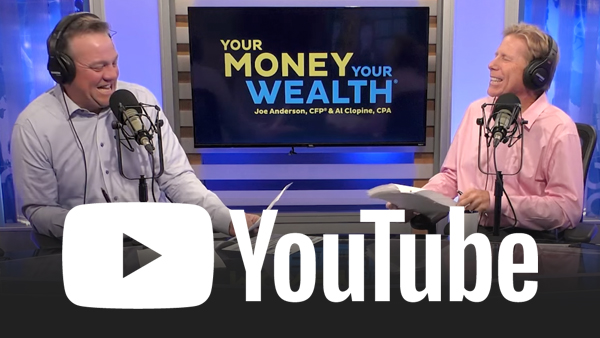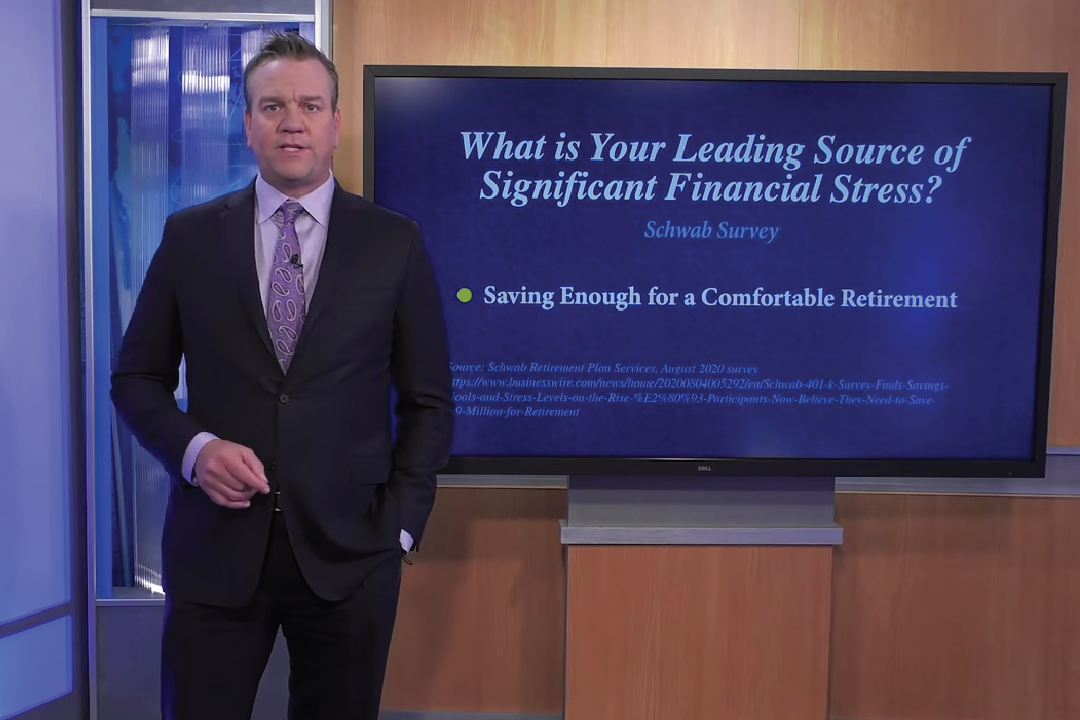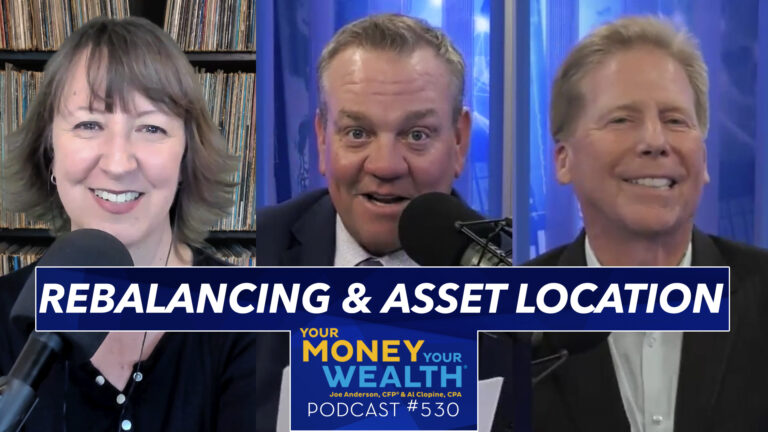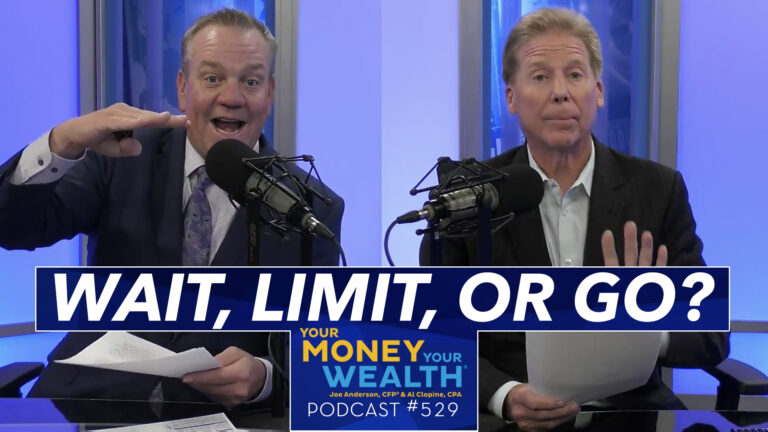In order to retire comfortably at age 60, what should you be doing with your finances when you’re in your 20s? Joe and Big Al discuss a framework for getting started planning for retirement. Plus, if you’re a small business with a SIMPLE IRA plan, is it stupid to save for retirement in a brokerage account rather than a traditional IRA? If you inherited money and promised to donate to charity, should you do Roth conversions? What’s the most efficient way to pay financial advisor fees, and what’s a good strategy for making pre-tax and post-tax retirement contributions?

Show Notes
-
- (00:51) A Framework for Getting Started in Planning for Retirement (Anonymous)
- (05:36) I’m 24. What Should I Do to Retire Comfortably at 60? Michael, 24 (Binghamton, NY)
- (12:14) I’m 32. Opened a SIMPLE IRA. Is It Stupid to Fund Brokerage Instead of Traditional IRA? (Ron Burgundy)
- (17:42) I Inherited $450K, Promised to Donate to Charity. Should I Do Roth Conversions? (Allison, Northern Virginia)
- (23:02) What’s the Most Efficient Way to Pay Advisor Fees? (Nick, OH)
- (26:06) Strategy for Pre-Tax and Post-Tax Retirement Contributions? (Dave)
- (29:56) The Derails
Free financial resources:
WATCH | YMYW TV: Cracking the Code – Succeeding Financially at Every Age
LISTEN | YMYW Podcast #391: Spitballing Retirement Planning in Your 30’s (and even in your 20’s!)
LISTEN | Top 10 Most Popular Your Money Your Wealth Podcast Episodes (Spotify playlist)
Listen to today’s podcast episode on YouTube:
Transcription
In order to retire comfortably at age 60, what should you be doing with your finances when you’re in your twenties? A framework for getting started planning for retirement – that’s today on Your Money, Your Wealth® podcast 419. Plus, if you’re a small business with a SIMPLE IRA plan, is it stupid to save for retirement in a brokerage account rather than a traditional IRA? If you inherited money and promised to donate to charity, should you do Roth conversions? What’s the most efficient way to pay financial advisor fees, and what’s a good strategy for making pre-tax and post-tax retirement contributions? Visit YourMoneyYourWealth.com and click Ask Joe & Big Al On Air to send in your money questions, or to get a retirement spitball analysis. I’m producer Andi Last, and here are the hosts of Your Money, Your Wealth®, Joe Anderson, CFP® and Big Al Clopine, CPA.
A Framework for Getting Started in Planning for Retirement (Anonymous)
Joe: “Would you guys devote in episode or two to get started in retirement? In other words, what advice or basic plan framework would you give folks just starting out? Advice I would give my 26-year-old college grandkid is something like this. Contribute to your 401(k), get your employer match, contribute to a Roth annual match. Both invest in low fee mutual funds. Save 15% for retirement, spend only 25% on housing. Stuff like this.“
Al: Okay, well, you already did it. Done.
Joe: There you go. So this is an email to Andi. This is probably not an email we should read. We should probably come up with a show, talk about the things that he wants versus me just reading it cold and saying, oh-
Al: Here’s what I’m gonna say. I actually like the concept, Mr. Anonymous-
Joe: But don’t we have, I did a- What did I do, Andi? I did something.
Andi: You’d have to be more specific.
Joe: I did a webinar or there was a video of something of investing in your ‘20s.
Al: Yeah, but let’s do a TV show. I think that’s a- let’s do that. That’d be a good topic. Instead of rehashing all the ones we do.
Joe: Sure. Yeah. Check the vault there because I know I did something.
Andi: All right. You got it. But in the meantime, the next question actually rolls very nicely from this one.
Joe: Got it. Okay. But yeah, I think we can definitely put some content together there, but yeah, it’s pay yourself first, first and foremost. So here’s kind of the rules of saving in my opinion, is that you go to the 401(k) until the match. You look at your tax bracket, my personal favorite is always go Roth IRA to the match. If they don’t have a Roth option, you go pre-tax to get the match because then of course you get free money. And then from there, if you wanna save more, then I would open up a Roth IRA and fully fund the Roth. If I wanna save more, then I go back to the 401(k) and I fully fund the 401(k). If I wanna save more, then I start opening up a brokerage account and I start funding that. And if I wanna do more things after that, then I would look at converting and saying, okay, well what tax bracket am I in? Am I fully funding the 401(k)? Is there ways that I can get money out of it? Do I have after-tax components in the overall plan? You know, then you can get a little bit more, I guess, creative. Yeah. Do you wanna say 15%? Ideally, we wanna save 15% of net, not gross.
Al: Right. I would say even 20%. 20% of gross is probably a decent number.
Joe: And then you would wanna look at increasing that number by 1% per quarter.
Al: Yeah, because there’s no 26-year-old that’s gonna start saving 20%. They’ll probably save 3%. If that. So the next year’s 4%, or maybe it’s 6% or next year it’s 7%, 8%, and 9%, whatever, work their way up to 20%.
Joe: Or just try to do it quarterly too, because you know, they don’t really feel, you can’t, it, it’s hard to feel 1% or .5%. And so you’re just doing it quarter by quarter by quarter. So let’s say you start with 3% and then at the end of the year, you know, you could be at 5%. And then at the end of two years, you could be at 10%. And so doing it gradually or slowly I think is a great way to go. Or you could do even do it monthly.
Al: Yeah, you could. Or you could wait till you get a raise and instead of banking all that money or spending all that money, then maybe you take 1/3 of it, but the other 2/3 invest in your 401(k).
Joe: Yep. You wanna have at least, 6, 8 months of net pay in cash reserves.
Al: Yep. Agreed.
Joe: I think 25% of housing, what’s your rule of thumb there?
Al: Well, it doesn’t work in California, I’ll tell you that because housing and rent’s too expensive. So I don’t know that there’s an exact percentage, but probably 30%. I’m probably comfortable with 30% or maybe even a little bit more.
Joe: 30% of gross or 30% of net?
Al: 30% of- well, that’s a good question. Probably net. Yeah. I mean, it just depends where you live. Now, if you live in a, in a lower cost area, then 25% is probably doable. But people say that as a rule of thumb because that’s what banks used to look at and then cost of housing got so much more expensive.
Joe: Yeah. It is absolutely crazy. Alan and I live in Southern California, in San Diego, and it’s almost impossible to buy in here.
Al: Yeah. Especially, can you imagine if you’re in your 20s trying to buy a home right now?
Joe: No.
Al: It’d be crazy.
Joe: Right. I mean, in your 30s or 40s trying to buy a home-
Al: It’s almost impossible.
Joe: It’s like, oh my God. A decent home is couple million bucks. Yeah. Like this is stupid. Yeah. I don’t want anything to do with this. All right. Hope that helps. We’ll keep it going. We’ll do some more stuff like this. Whatever. You guys let us know. Let Andi know what you want and we will get her done.
I’m 24. What Should I Do to Retire Comfortably at 60? Michael, 24 (Binghamton, NY)
Joe: We got Michael, 24, from Birmingham, New York.
Andi: Binghamton.
Joe: Oh, big Bigham. Big and Binghamton. “Hey, Big Al, Andi and Joe. Currently sitting in a Burger King drive-through debating on whether to get a Whopper Jr or a regular Whopper. It’s too hard to choose.”
Al: Okay. All right. We got the context now, right?
Joe: I love it. “Anyway, I just started listening to you guys in January of this year and love listening to Big Al throw the hammer down on Joe when it comes to those complicated Roth 401(k) questions. I’m 24 currently. Was wondering if you guys can help me with the retirement question. I only have about $140 in my Roth IRA, but I wanna make sure I’m doing things in the right order. This is my only retirement savings currently. I know I should prioritize my Roth IRA, but I also have a pension with my company and I look forward to staying with them for a foreseeable future and hopefully one day get the pension when I retire in 30 years of service. My question is, should I open a brokerage account on top of the Roth and the pension? And is there such a thing as saving too much for retirement? I feel extremely behind and hope to get caught up by maxing out my Roth IRA by the end of the year and every year after that. The hope- the amount of the pension currently after 30 years is of services around $3700 a month. Also, not sure if this pension is just a retirement plan, since it’s with the railroad company. Is there anything else I could be doing to make sure I’m caught up in terms of being on track to retire comfortably at 60? Thank you for your show. Love listening to it while I’m doing my private goat yoga sessions. I drive a 2017 Ford Focus. Have no pets. However, I’m definitely a cat person. I also love to drink some Mich Ultras while fubbling all of my shots on the course with my buddy, Keith.” All right.
Al: Okay. Cool. Well, this does kind of dovetail into our last question. 24 years old. Well, Michael, I’ll tell you one thing right now, you’re not way behind. You’re probably in the top 1% that you’re even thinking about retirement at age 24. So there’s plenty of time to catch up.
Joe: Yeah. So he’s gonna fully fund the Roth. Is there such a thing that’s saving too much for retirement?
Al: No.
Joe: No.
Al: No, there’s not. However, I would say this, you wanna make sure you have an emergency fund before you load up- Roth IRAs are always a great idea when you’re young, because you’re usually in lower tax brackets. But make sure you have 3 to 6 months of emergency funds, or as you just said, Joe, 6 to 8, doesn’t matter, whatever you’re comfortable with. But make sure you have something so that you, if you have a flat tire, something like that, you don’t have to dip into your credit card.
Joe: So, a couple of other things too, when you fully fund a Roth IRA. If something happens, you can always have access to those dollars. We don’t really encourage people to open up a Roth take- raid from it the next year.
Al: But you could.
Joe: But you could.
Al: Your contributions. Not your income or earnings, but your contributions.
Joe: So Michael puts in $6000 this year, puts in $6000 the following year. Something happens, he needs $10,000. Well, he has $12,000 of free cashflow from that because those are all after-tax contributions or FIFO tax treatment. So yeah. You can never save too much for retirement. There’s never in my 20 some odd year history- you sit down with a couple and they got millions and they’re like, damnit, I spent- I saved way too much way-
Al: – way too much. Now what all that means is then you’re more flexible, right? You can retire earlier if you want to. You can live a better retirement lifestyle than you were planning or thinking. You can give more to charity, you can have more for kids’ college or grandkids’ college. Whatever it may be. No, that’s a good thing.
Joe: Or do the planning. Figure out exactly how much money that you should be saving to get the lifestyle that you need. So if you wanna have a better balance and say, I don’t wanna save too much. I don’t wanna have a lot of wealth later in life. I just wanna spend exactly what and just be just fine, and live in cruise control, you can do that. But just you gotta run some numbers, you gotta do some analysis. You gotta say, I’m gonna retire at 60, at $3700 a month. I’m spending X amount of dollars today. I want to maintain that lifestyle for the rest of my life. I don’t want to increase it or decrease it. And then you can do some math and say, you know what? You need to save $6000 a year and if you save $6000 a year, you’re right on track at age 24. Or you might have to save a little bit more or a little bit less. But here’s what you do. Look at what you’re spending today. Inflate that by 3.5%. So go online, get a calculator, whatever you’re spending today, inflate that over- What he’s 24? So what is that? 36 years? So you’re spending $30,000 a year today, inflate that over 36 years, at 3.5% inflation, you’re gonna find a number. You already know that you’re gonna get $3700 a month in pension. So you take what that inflated number is, minus your pension. You’re gonna come out with a shortfall. Whatever that shortfall is- or it could be positive. If it’s positive that your pension’s gonna cover everything, then don’t save a dime. You know, buy the Whopper and the Whopper Jr. Load up some onion rings.
Al: Let’s not get crazy.
Joe: And go buy your own goat. Do whatever you want with it. You know what I mean? So, so, but yeah, you can do some planning, so you can figure out exactly what you need to do. And at 24 you can get super dialed in here. Okay.
Al: I think that’s too hard for a 24-year-old. I think this, have an emergency fund. Try to save as much as you can in a Roth IRA. Work yourself up to saving 20% of your income. You don’t even have to have a plan, you’re- it’s gonna work out just fine.
No matter which stage you’re in in life, decisions you make will affect your financial security today and for years to come. Visit the podcast show notes at YourMoneyYourWealth.com to watch YMYW TV and learn to Crack the Code to Succeeding Financially at Any Age. Pretty sure this is the “something” Joe was talking about earlier. In this episode, Joe and Big Al walk you through financial strategies and actions to take in your 20’s, 30’s, 40’s and 50’s that will help you overcome any previous missteps, and set you up for a more successful retirement. Watch it and download the free companion guide in the podcast show notes at YourMoneyYourWealth.com. Just click the link in the description of today’s episode in your favorite podcast app to get there, and check out YMYW podcast episode 391 on Spitballing Retirement Planning in Your 20s and 30s, too. Then spread the knowledge and share YMYW with your friends, family and colleagues.
I’m 32. Opened a SIMPLE IRA. Is It Stupid to Fund Brokerage Instead of Traditional IRA? (Ron Burgundy)
Joe: “I don’t right so good, so this should be easy for you, Joe.” He’s a jackass right off the gates here.
Al: Right off the bat.
Joe: Right off the bat.
Al: And write is W, not R.
Joe: I don’t write- r-i-g-h-t. He doesn’t take rights.
Al: No. No. Right.
Joe: “32 years old and engaged, but currently filing single. I’m maxing out my newly open Simple IRA with a dollar-for-dollar match up to 3% of my salary, and I’m struggling to understand why I should also fund my traditional IRA. I’m over the income limits for the tax deduction on the IRA contributions, and I’m thinking the flexibility of putting an extra $6000 into my brokerage would be a better solution. I guess I can’t do conversions down the road if that extra money is in a brokerage rather than an IRA, but is funding the brokerage rather than an IRA stupid?” Okay. He’s got a “salary of a $100,000. Bonus of $50,000, (k)1 of $50,000, brokerage account is $150,000, traditional IRA $30,000, Roth IRA $100,000. Simple IRA of $20,000. Checking, savings $30,000. I’m also thinking of converting most, if not all, my Simple IRA contributions into the Roth at the end of each year and just biting the bullet on the taxes. At my age, I feel that 35 plus year tax-free growth is worth the taxes now. What do you think? 2021 Chevy Colorado. My dog’s name is Baxter and I enjoy long walks on the beach. Have many leather bound books and my apartment smells like rich mahogany. Thanks gang, and as my sports reporter would say, “Whammy!”
Al: Whammy.
Andi: This was from Ron Burgundy.
Al: All right. You can picture it now, right?
Joe: Yeah. Got him.
Al: You got the set even.
Joe: I do. So a couple things that I have a question is why is Ron- why did he open up a Simple plan? Unless he- it sounds like he is the employer as well. So does he have employees? What is he doing?
Al: He also talked about a match?
Joe: Yeah. That he’s matching himself.
Al: He’s matching himself maybe?
Joe: Right. And then he is got K1 income of $50,000 to $75,000. And you cannot convert a Simple, it has to stay open for a period of time.
Al: True.
Joe: So I forget the time period. Two years?
Al: Two years. Yep.
Joe: Yeah. Or else you get a penalty.
Al: Right.
Joe: So if he’s trying to invest in a Simple IRA and then convert it at the end of each year, bite the bullet.
Al: Doesn’t work.
Joe: It doesn’t work. So here’s what I would do, Ron. If you’re a sole proprietor, I would set up a solo 401(k). You could set up a solo 401(k) and you could do a Roth option in the solo 401(k). So you could put- how old is he?
Al: Well, he’s 32, so he could put $22,500 in a solo 401(k).
Joe: $22,000. And then he could also put probably another- I don’t know-
Al: Depending upon the profits, maybe that’s-
Joe: – $75,000 to $50,000. So 20% of that. Yeah. $10,000.
Al: $10,000, yeah. Call it another $10,000 if you want to.
Joe: Right. And that could be pre-tax. So you could put $32,000, $35,000 away into the plan. And most of it could be Roth. So if you’re doing Simple and then a traditional IRA, I agree with you. I don’t think that makes any sense at all. I think you’re doing a good job of building up your brokerage account. So I would continue to do that. But you’re right. I think tax-free growth over 20, 30 years is gonna far out beat anything that’s tax-deferred.
Al: Yeah, I agree. Especially when you’re 32, chances are your income’s gonna go up. You may never be in these low brackets again during your working years. So yeah, when you’re young, unless there’s unusual circumstances, definitely take advantage of the Roth because all that tax-free growth for decades is amazing.
Joe: Yeah, so look into that. If you’re doing the Simple, just because it’s a Simple plan and you have employees, then I get it, right? But just remember, you can’t convert a Simple plan. However, with the SECURE Act, now that the Simple plan can do a Roth. So if you’re gonna do it and convert it, don’t do that. Just set up a Roth Simple IRA. Because you won’t be able to convert the Simple into the Roth anyway.
Al: Yeah, I don’t- does that, is that in 2023?
Joe: ‘24?
Al: ‘24, maybe?
Joe: ‘24.
Al: Yeah. Look that up. But anyway, you can also- at your income level. Let’s see. Oh, you can’t do a Roth contribution, can you? And you can’t do it back to Roth because the Simple IRA-
Joe: -because the Simple’s gonna get- yeah, the pro rata rule.
Al: Got it. So you might have to wait a year for that if in fact you have employees. If you do have employees, I get why you did a Simple, because then it’s- you don’t have to do as much match and all that stuff and it’s way easier to administer.
Joe: But if you have employees, and you can’t do other things that we just mentioned, I would not fund an IRA. I would fund your brokerage account. And invest in tax efficient vehicles, you’re going to still get close to tax deferment. And you’re gonna get capital gains treatment on any other gain.
Al: Yeah. The other thing too is make sure you have an appropriate emergency fund. So, make sure you have that first before you start trying to invest extra money.
Joe: All right. Thanks Ron.
I Inherited $450K, Promised to Donate to Charity. Should I Do Roth Conversions? (Allison, Northern Virginia)
Joe: Allison from North Virginia writes in. “Hey guys, this is Allison from Northern Virginia-”
Al: Yeah. As opposed to Central or Southern. Like it.
Joe: “-who wrote in previously. Joe was right, my 2015 Mazda 3 is red.”
Al: Oh, we guessed that, didn’t we? Apparently you guessed it.
Joe: Yeah. Oh, see I visualize.
Al: I know you do.
Joe: I’m just trying to-
Al: That’s what makes you so good. You see people in their red Mazda.
Joe: “I’m still listening on my long commutes. Circumstances have changed since my last question. I’ve inherited around $450,000. $175,000 a brokerage account, $700,000- or $70,000 in a traditional IRA. And the rest is cash. Most of the cash will likely be saved as an additional down payment for a new condo that will suit my needs as I age. I promised my family member from whom I inherited the money that I would make a 10% charitable donation to a specific charity. Assets were POD in the beneficiaries to skip estate, so very little money in the estate to give to the charity, and so I’ll be making a $45,000 charitable contribution this year. I have about $30,000 in a traditional rollover IRA. I currently have around $50,000 in my Roth, my TSP’s around $500,000 with 2/3 traditional, 1/3 Roth. Should I do a Roth conversion of the entire rollover account this year and use that large charitable contribution to offset the taxes? My itemized deductions are usually $14,000. My AGI will likely be around $125,000. I max out all my retirement accounts. I’m single, no dependents. Thoughts?” Okay. Allison got some cash.
Al: Yeah, she did. She got $175,000 in a brokerage account, $70,000 in an IRA and the rest in cash. So that’s pretty good. She also has-
Joe: -$30,000 in the traditional rollover IRA.
Al: Yeah. And she’s gonna give away $45,000. And here’s the rule. Here’s the rule is you look at your adjusted gross income and if you give away cash, you’re allowed to deduct up to 60% of your income. So let’s just say $125,000 because that’s what you put here, right? So 60%, that is probably what, $75,000 ish? Something like that. So your charitable contribution in cash could be, you know that, that figure about $75,000. Now if you gave away appreciated stock, which if you had other stock that was appreciated, that would be even smarter. But there you could only give away 30%. So 30%’s gonna be, I don’t know, $35,000, $40,000, which still- it’s close, right? Maybe you could give away some of- if you have other appreciated stock. The reason why you’d rather give appreciated stock is because you still get the charitable donation and you don’t have to pay tax on the gain on sale. So that’s a- but if you don’t have that, yeah, you can give away the cash and it will be fully deductible based upon what you just told us.
Joe: She’s gonna convert $30,000. So she’s asking, since I have a $45,000 charitable contribution this year, if I convert $30,000, is that gonna offset?
Al: And the answer is yes.
Joe: So she will not pay tax on the $30,000 conversion, because she has made a very large charitable contribution.
Al: And in fact, since the charitable contribution is higher than that Roth conversion, she’ll have an extra $15,000 to go against her other income.
Joe: Now the $70,000 that she inherited from the traditional IRA, she cannot convert that and that won’t have to be distributed out within 10 years.
Al: Correct.
Joe: So that could add income depending on the deceased, on how old the deceased was when the deceased passed. But yeah, I like that strategy, Allison.
Al: Yeah, I do too. And so that’s a good point on the traditional. So you might think about $7000 a year-ish that you’re gonna have in extra income. If you wanna make the charitable contribution all this year, if that’s what the family’s expecting, great. If you can spread it out a little bit, maybe save some for next year to go against the $7000-ish that you have to distribute from the inherited IRA, that could be cool too.
Having Joe & Big Al spitball for you on YMYW is a great first look at your financial decisions, but it shouldn’t be your only look before you leap. Schedule an in-depth review of your entire financial situation with an experienced financial professional on Joe and Big Al’s team at Pure Financial Advisors You can meet in person at one of Pure’s 7 offices in Southern California, Seattle, Denver, or Chicago, or via Zoom right from your couch, wherever you may happen to be. Find out how much if any you should you convert to Roth, how you may be able to pay less tax, and whether you can collect more Social Security benefits. Make sure your investments align with your risk tolerance and your retirement needs and goals. Don’t worry about paying commissions, because Pure is a fee-only fiduciary. They don’t sell investment products, so there are no commissions, and the law requires them to act in the clients’ best interest instead of their own. click the link in the description of today’s episode in your favorite podcast app, go to the snow notes, then click the Get an Assessment button and schedule your free financial assessment now.
What’s the Most Efficient Way to Pay Advisor Fees? (Nick, OH)

Joe: “Hello Andi, Joe and Big Al. Hope all as well. This is Nick from Ohio. Need some clarity on fees please? My advisor charges 1%. I have $600,000 in a Roth IRA that I contribute $6000 to every year. Then my advisor removes $6000 throughout the year for his fee. Question, is this the most advantageous of effective way to pay for advisor’s fees? It seems to me that I would like to write a check to him while keeping the Roth dollars and/or shares alone working in my account to continue the time value of the Roth investments rather than removing them for fees. It just seems like we are exchanging one for the other. Do advisors only pull the cash in the account? This could be a reason that he keeps a portion of my Roth dollars in cash for his fees. Can I even write a check or is this just the way the industry is to make sure they get their fees? Peace.” Great question, Nick. Yeah, you can write a check for sure if that’s what you would like to do. However, the most advantageous- how the rules kind of work here is that you could pull everything, let’s say from a brokerage account, or you could cut him a check. So let’s say you had a brokerage account and then you’re like, okay, just pull the fees from all of my investments out of this brokerage account. You could do that, or you could do it pro rata, which it sounds like what he’s doing. So you got money in a Roth that he’s pulling fees from. You got money, maybe in a IRA that they’re pulling fees from or in the- So, but yeah, if you wanna cut a check, I think that makes the most sense because- Hey, you’re right. You’re putting $6000 in and if $6000’s the fee, yeah, you want to make you maximize that as, as much as you absolutely can. So if- if that’s what your choice is, I would tell ’em, hey, I just want to cut you a check for the fee, or can you pull it from my brokerage account?
Al: Yeah, exactly. And I would say it this way, when it’s a Roth IRA, you wanna pay the fees outside of the retirement account. If it’s a regular IRA, I would actually pay the fees inside the account.
Joe: – inside the account because you don’t have to pay tax on the fee.
Al: That’s right. And basically you’re reducing that account, which is not tax-favored compared to your brokerage account. So I would look at it that way.
Joe: But he can’t pay the fee for the Roth and put everything into the brokerage account. I mean into the IRA.
Al: I agree with that.
Joe: Yeah. You can’t split that.
Joe: Just say, hey, let’s say you got $1,000,000 in the IRA and $600,000, so let’s say $16,000 is your fee. And you’re like, alright, I pull $16,000 from my retirement account, all pre-tax, because you’re not paying $16,000. You’re paying something a lot less than that because you don’t have to pay tax on the distribution.
Al: Yeah, I agree with that.
Joe: So you can’t do it that way. You could take everything from the brokerage account or you could do it pro rata.
Al: Yeah, exactly. And I guess maybe the- if you think about advisors, a lot of advisors don’t wanna track you down for that $6000 check, so that could be an issue. So if you had a brokerage account, they could pull it from that. They might be happier. But there’s nothing wrong with writing a check as long as you pay it currently.
Joe: All right, Nick, thanks for the recap. Great question.
Strategy for Pre-Tax and Post-Tax Retirement Contributions? (Dave)
Joe: “Hello, Joe and team. Another question about my employer 401(k) plan with Fidelity around strategy for pre and post-tax contributions. My plan allowed- excuse me- for 401(k), Roth 401(k) after tax contributions, which get employer matches of pre-tax amounts. Question is, what is the optimal approach on which of these to fund? And in which sequence? I’ve been maxing out my 401(k), but I also wanna start the Roth 401(k). In prior years when my 401(k) was maxed, I would contribute with after-tax contributions to get additional employer matching, but I feel I can do more with some thought behind it. Thanks for all you do. Dave.”
Al: Well, we could use a little more information.
Joe: More information.
Al: Like how old are you? And what you have saved already? What’s your tax bracket? What’s you’re spending? We could really help you out. So, but here’s how we might think about it, which is this. As you know, Joe and I are big believers in having some money in a Roth 401(k). If your tax bracket is low enough, it’s a no-brainer. It all goes into the Roth 401(k), the $22,500. Plus another $7500 if you’re 50 and older, we’re not sure Dave, how old you are, goes into the Roth. End of story. And then you can- if you still have extra do after-tax money, that then can be converted to a Roth. Yeah, no brainer. If you’re in a high tax bracket, it might give you a little pause. Now it’s like the tax deduction versus the tax-free growth, and we’d need a little more information on that.
Joe: Yeah, because it’s all going to boil down to, what’s the end game? You know, it’s like, when do you wanna retire? How much money do you wanna live off of? What’s your other fixed income sources? Are you gonna work in retirement part-time? When do you wanna spend a lot more money in retirement? and travel? Or do you want to spend less than just gonna be a couch drunk?
Al: Right, right. Yeah, exactly. Where does your income come in retirement? So what does that tax bracket look like versus now? Now, if you’re, let’s say you’re 66, right? And you’re in a very high tax bracket, and next year you’re gonna be in a lower bracket, then go for the deduction and do some Roth conversions when you retire up to age now 73 for required minimum of distribution. So the answer is, it depends. But definitely take a look at 401(k) and Roth 401(k). Both of those are- can be appropriate in different circumstances. You can only do $22,500 for the combination of those two. So it’s not like you could do $22,500 of regular 401(k) and $22,500 of Roth 401(k). It’s $22,500 total. You figure out how you wanna mix and match that, and then after you hit that, then you can do after-tax contributions, which can be converted to a Roth IRA.
Joe: Okay, thanks for the question, Dave.
Andi: Bing-hamton, fast food restaurants, goat yoga, the Chevy Colorado, and memories of Irish setters and potato vines in the Derails at the end of the episode, so stick around. Help new listeners find YMYW telling your friends about the podcast, and by leaving your honest reviews and ratings for Your Money, Your Wealth® in any and all podcast apps that accept them.
The Derails
_______
Listen to the YMYW podcast:

Amazon Music
AntennaPod
Anytime Player
Apple Podcasts
Audible
Castbox
Castro
Curiocaster
Fountain
Goodpods
iHeartRadio
iVoox
Luminary
Overcast
Player FM
Pocket Casts
Podbean
Podcast Addict
Podcast Index
Podcast Guru
Podcast Republic
Podchaser
Podfriend
PodHero

Podknife
podStation
Podverse
Podvine
Radio Public
Rephonic
Sonnet
Spotify
Subscribe on Android
Subscribe by Email
RSS feed
IMPORTANT DISCLOSURES:
Pure Financial Advisors is a registered investment advisor. This show does not intend to provide personalized investment advice through this broadcast and does not represent that the securities or services discussed are suitable for any investor. Investors are advised not to rely on any information contained in the broadcast in the process of making a full and informed investment decision.
• Investment Advisory and Financial Planning Services are offered through Pure Financial Advisors, LLC, a Registered Investment Advisor.
• Pure Financial Advisors LLC does not offer tax or legal advice. Consult with your tax advisor or attorney regarding specific situations.
• Opinions expressed are not intended as investment advice or to predict future performance.
• Past performance does not guarantee future results.
• Investing involves risk including the potential loss of principal. No investment strategy can guarantee a profit or protect against loss in periods of declining values.
• All information is believed to be from reliable sources; however, we make no representation as to its completeness or accuracy.
• Intended for educational purposes only and are not intended as individualized advice or a guarantee that you will achieve a desired result. Before implementing any strategies discussed you should consult your tax and financial advisors.
CFP® – The CERTIFIED FINANCIAL PLANNER™ certification is by the Certified Financial Planner Board of Standards, Inc. To attain the right to use the CFP® designation, an individual must satisfactorily fulfill education, experience and ethics requirements as well as pass a comprehensive exam. Thirty hours of continuing education is required every two years to maintain the designation.
AIF® – Accredited Investment Fiduciary designation is administered by the Center for Fiduciary Studies fi360. To receive the AIF Designation, an individual must meet prerequisite criteria, complete a training program, and pass a comprehensive examination. Six hours of continuing education is required annually to maintain the designation.
CPA – Certified Public Accountant is a license set by the American Institute of Certified Public Accountants and administered by the National Association of State Boards of Accountancy. Eligibility to sit for the Uniform CPA Exam is determined by individual State Boards of Accountancy. Typically, the requirement is a U.S. bachelor’s degree which includes a minimum number of qualifying credit hours in accounting and business administration with an additional one-year study. All CPA candidates must pass the Uniform CPA Examination to qualify for a CPA certificate and license (i.e., permit to practice) to practice public accounting. CPAs are required to take continuing education courses to renew their license, and most states require CPAs to complete an ethics course during every renewal period.














